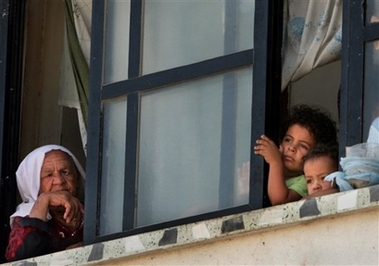Israeli textbook offers Palestinian view
(AP)Updated: 2007-07-23 10:01
JERUSALEM - Israel's Education Ministry said Sunday it was offering a new textbook for Arab third-graders acknowledging for the first time that the creation of the Jewish state was a tragedy for Palestinians.
 Palestinians relatives watch from a window during the funeral of Hamas militant Mohammed Maroufl in Beit Lahya, northern Gaza Strip, Sunday, July 22, 2007. [AP]  |
The textbooks for the upcoming school year give the Jewish narrative of the events of 1948 and 1949 when Israel's creation drew an invasion by Arab armies in a conflict that displaced some 700,000 Palestinians. They point out Jews' historical connection to the Holy Land and their need for a state because of persecution in Europe, said Dalia Fenig, an Education Ministry inspector.
But for the first time, the book also explains why the war was a tragedy from the Palestinian perspective, referring to the Arab defeat as "al-Naqba," Arabic for catastrophe and the common Arab term for the war.
"The new approach says, why should you hide anything? That won't make it disappear and ... the issues can be debated," Fenig said.
However, she said the Education Ministry has no plans to introduce the Arab narrative into textbooks for Jewish students.
Some hardline Israelis vowed to fight the decision by Education Minister Yuli Tamir, insisting it made Israel look like it was apologizing for its own existence.
Tamir "is expressing a sort of political masochist spirit and ... a total lack of national pride," Strategic Affairs Minister Avigdor Lieberman of the hawkish Yisrael Beiteinu Party told Army Radio.
Other Israelis hailed the new textbook.
"There are those who think that recognizing the suffering and loss of the other side subtracts from their own suffering and loss," said Amnon Beeri-Sulitzeanu, executive director of the Abraham Fund, a nonprofit group that works for coexistence among Israel's Arabs and Jews.
"I think this is a small step in the direction of a shared society and a shared future," he said.
Official Israeli histories of the country's establishment, especially those written for schoolchildren, have typically focused on the heroism of Israeli forces and glossed over the Palestinian flight, attributing the mass exile to voluntary escape if mentioning it at all.
In recent years, several Israeli historians have published books claiming that while many Palestinians did flee of their own accord, many others were forced from their homes as fighting raged and then never allowed back because the nascent Jewish state feared it would be swamped by refugees.
Palestinians demand the right of return of the refugees and their descendants, about 4 million people altogether, to their original homes in Israel where 5.4 million Jews live. Israel rejects the demand, saying the refugees should receive compensation and be resettled where they now live, or in a Palestinian state.
The Arabs who remained inside Israel now make up about 20 percent of the country's population. While they are Israeli citizens, they generally see themselves as part of the Palestinian people.
Ali Harish, an Israeli Arab teacher, said the absence of the Arab perspective in textbooks until now did not mean it was absent from the classroom.
"When I teach history, of course I use this term, to give them a fair picture," Harish told Army Radio. "I'm so surprised by the uproar over this."
|
|
|
||
|
||
|
|